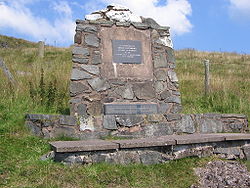- Battle of Mynydd Hyddgen
-
Battle of Mynydd Hyddgen Part of The Welsh Revolt, 1400–1415 
Memorial to the slain of Mynydd HyddgenDate June 1401 Location Mynydd Hyddgen, in the wilds of Plynlimon (Pumlumon)
52°30′22″N 3°47′49″W / 52.506°N 3.797°WCoordinates: 52°30′22″N 3°47′49″W / 52.506°N 3.797°WResult Welsh victory Belligerents Welsh rebel forces English and Flemish settlers Commanders and leaders Owain Glyndŵr Unknown Strength 400-500 1500 Casualties and losses Unknown 200 killed More taken prisoner
The Battle of Mynydd Hyddgen was part of the Welsh revolt led by Owain Glyndwr against English rule that lasted from 1400 to 1415 and the battle occurred in June 1401. Its location was on the western slopes of Pumlumon, near to the present-day Ceredigion/Powys boundary.
Contents
Background
The Battle of Mynydd Hyddgen is considered the first victory in the field won by Owain Glyndŵr (1359–c. 1416), leader of the Welsh revolt and it could be said that it set the tone for the spread of the rebellion in its early stages and at a key time if the rebellion was to gather meaningful momentum.
The battle began when English settlers of Pembrokeshire and settlers of Flemish descent (who had also settled in Pembrokeshire, encouraged by the earlier English King Henry I of England), attacked the small army of Glyndŵr, which was encamped at the bottom of the Hyddgen Valley.
The two armies
The settlers were reinforced by a large force of English soldiers and Flemish mercenaries. This was Owain's early base as his rebellion started and spread. It is estimated that his force at this stage amounted to five hundred men, just a third of the attacking force and some records, such as the 'Annals of Owen Glyn Dwr' written by Gruffydd Hiraethog many years later in 1550 and based on earlier accounts that have not survived, put his force at just 120 men.[1] It is thought that Owain's force would have been made up mostly of archers mounted on hill ponies that would have been well suited for travelling across boggy or mountainous regions.[1] The English-Flemish army meanwhile would have generally consisted of infantry with some light cavalrymen supporting them. Despite having decent equipment, many of the English-Flemish soldiers were lacking in military experience, and there was a general lack of discipline within their army.[2]
The battle
The precise location of the battle is not known, and little is known of the course of the battle itself.[3] Mynydd means "mountain" in Welsh. However, it is known that Glyndŵr's army was able to fight back these attackers (despite being outnumbered and on the low ground), killing 200, chasing the main force away and making prisoners of the rest. It can be assumed that Owain's success lay in the maneuverability of his light troops. The English army (being more heavily laden) would have had more trouble traversing on the marshy ground of the valley.[4]
Aftermath
The Annals of Owen Glyn Dwr record that "Owain won great fame, and a great number of youths and fighting men from every part of Wales rose and joined him, until he had a great host at his back."
The slain were buried at Bryn y Beddau, the 'Hill of Graves' nearby.
References
- ^ a b "Battles for Wales: Mynydd Hyddgen - 1401". Cambria Magazine. The Owain Glyndwr Society. http://www.owain-glyndwr-soc.org.uk/BattleMynyddHyddgen.html. Retrieved 9 October 2010.
- ^ The Owain Glyndwr Society
- ^ Hyddgen Walk
- ^ MbPost.com
External links
Categories:- Battles involving Wales
- 1401 in Europe
- 15th century in Wales
- History of Ceredigion
- Conflicts in 1401
Wikimedia Foundation. 2010.
